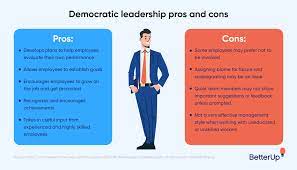7 Ways To Lead Your Business Like A Democratic Government
There’s no denying that democracy is having a moment. Countries all over the world are electing progressive leaders who are championing the rights of the people. And businesses are taking notice. More and more companies are adopting democratic leadership practices, giving their employees a greater say in how the business is run.
So what exactly is democratic leadership? It’s a style of management that gives employees a voice in decision-making, encourages open communication, and values collaboration. In other words, it’s the opposite of the traditional top-down management style.
There are plenty of reasons to adopt a democratic leadership style. For one, it fosters a more positive work environment. When employees feel like they’re being heard and their opinions matter, they’re more engaged and motivated to do their best work. What’s more, democratic leadership can lead to better decision-making because it takes into account the collective wisdom of the team.
If you’re thinking about making the switch to democratic leadership, here are seven ways to do it:
1. Encourage open communication: Create an environment where employees feel comfortable speaking up and sharing their ideas. This can be done through regular team meetings, one-on-one check-ins, or even an anonymous suggestion box.
2. Make decisions democratically: Whenever possible, let your team vote on major decisions affecting the business. This will help ensure that everyone feels invested in the final outcome.
3. Encourage healthy debate
democratic leadership style
The democratic leadership style is all about involving employees in the decision-making process and encouraging open communication. This type of leader believes that everyone has something valuable to contribute and that the best decisions are made when all voices are heard.
If you want to lead your business using a democratic leadership style, here are seven ways to do it:
1. Encourage open communication: Create an environment where employees feel comfortable speaking up and sharing their ideas. Encourage open dialogue and debate on important issues.
2. Seek input from employees: When making decisions that will affect employees, seek their input and advice. Consider their suggestions and give them weight when making your final decision.
3. Make decisions as a team: When possible, involve employees in the decision-making process. Brainstorm ideas together and come to a consensus on the best course of action.
4. Encourage creativity: Welcome new ideas and different points of view. Encourage employees to think outside the box and come up with creative solutions to problems.
5. Reward good ideas: Recognize and reward employees who come up with good ideas, even if they’re not used in the end. This will encourage others to share their own great ideas.
6. Be transparent: Share information openly with employees and keep them updated on company decisions and developments. This will help build trust between you and your team.
7. Lead by example: As the leader, you set
democratic leadership examples

When it comes to leading your business, you can take inspiration from democratic governments. Here are seven ways to lead your business like a democratic government:
1. Encourage debate and discussion.
In a democracy, decisions are made through debate and discussion. As a leader, you should encourage debate and discussion among your team members in order to make the best decisions for your business.
2. Seek input from all stakeholders.
In a democracy, all stakeholders have a say in decision-making. As a leader, you should seek input from all stakeholders when making decisions that will affect them. This will help ensure that everyone is on board with the decisions made and that they understand the reasoning behind them.
3. Be transparent.
In a democracy, government officials are transparent about their decision-making process. As a leader, you should be transparent about your decision-making process as well. This will help build trust among your team members and other stakeholders.
4. Be accountable.
In a democracy, government officials are held accountable for their actions. As a leader, you should be held accountable for your actions as well. This will help ensure that you are making decisions in the best interest of your business and that you are taking responsibility for the outcomes of those decisions.
5. Respect the rule of law.
In a democracy, the rule of law is respected and upheld by everyone. As a leader, you should respect
democratic leadership definition
There are many different types of leadership styles, but democratic leadership is one of the most effective for businesses. This type of leadership allows for a more collaborative environment where all employees have a say in decision-making. This leads to a more engaged workforce and ultimately, better results for the company.
So what is a democratic leadership definition? Simply put, it is a style of leadership where the leader makes decisions based on the input of the group. This type of leader values the opinions of others and believes that collective decision-making is more effective than making decisions alone.
There are several benefits to implementing a democratic leadership style in your business. First, it increases employee engagement as everyone feels like they have a say in the direction of the company. Second, it builds trust between the leader and employees as they work together to make decisions. Finally, it leads to better decision-making as all voices are heard and considered.
If you are looking to implement a more democratic style of leadership in your business, there are a few things you can do to get started. First, hold regular meetings where all employees have a chance to voice their opinions on company decisions. Second, encourage open communication by creating an environment where employees feel comfortable sharing their ideas. Finally, make sure that you take all employee input into consideration when making decisions for the company.





